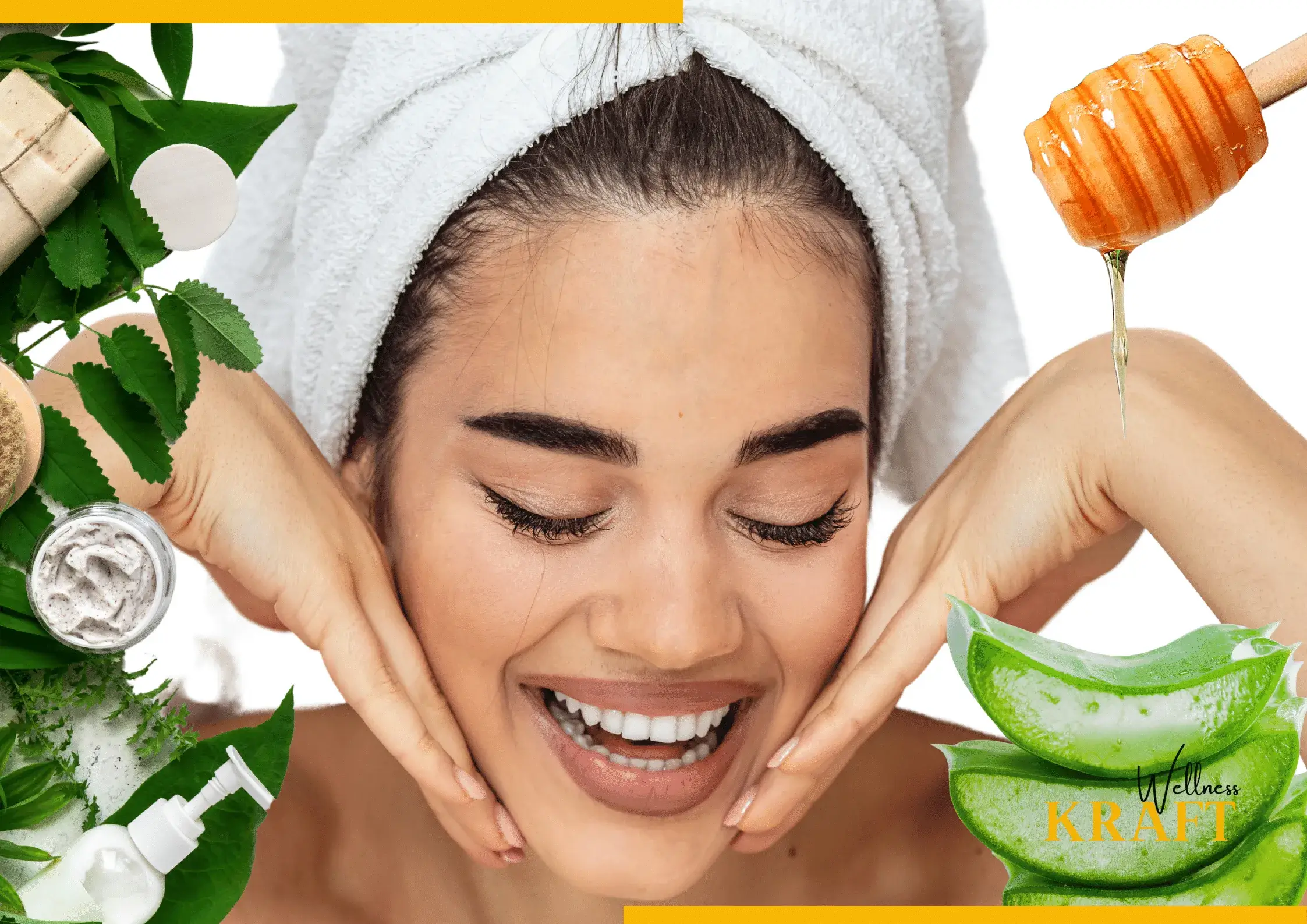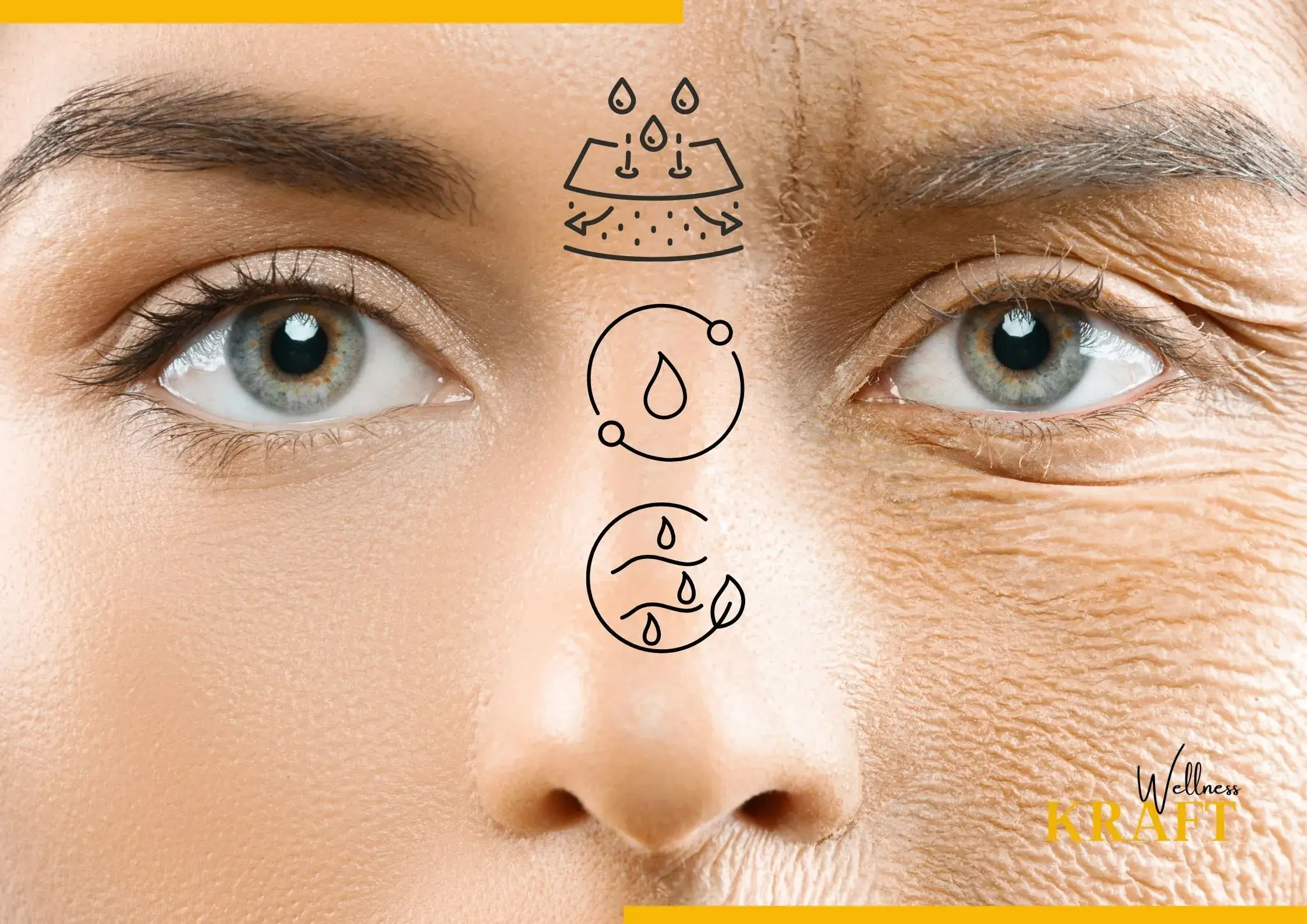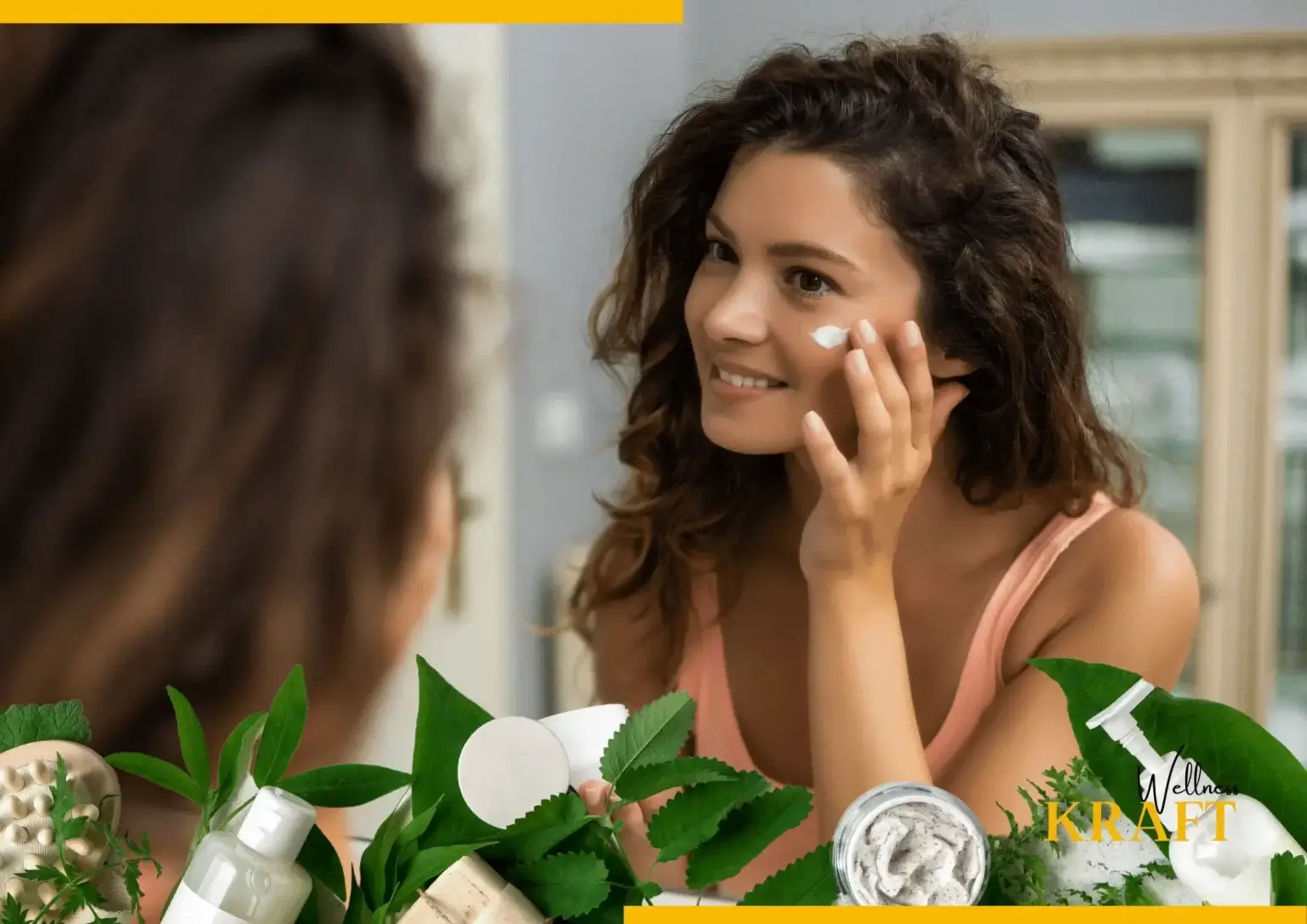“The monsoon is a time of renewal. Protect your skin from environmental damage by starting a fresh routine of skin care during monsoon.” – Wellness Kraft
Table of Contents
Introduction
The monsoon season offers relief from the scorching summer heat, but it also brings about distinct skin care difficulties. High humidity levels, frequent rain, and varying temperatures can greatly affect the health and appearance of our skin. Discover the impact of monsoon on your skin and learn practical advice to maintain a glowing and healthy complexion of skin care during monsoon season.
The impact of atmospheric humidity changes during monsoon season on our skin can be significant. High humidity levels can increase oil production, which may make the skin more susceptible to acne breakouts. High humidity levels may cause skin irritations and fungal infections. It is essential to comprehend these impacts to create a successful regimen of skin care during monsoon season.
Increased Humidity and Its Effects of Skin Care During Monsoon
During the monsoon season, elevated humidity levels may cause a rise in perspiration production in our skin. Excessive sweating, along with environmental pollutants and impurities, may cause blockage of pores. The exposure of our skin to bacterial and fungal infections can cause various problems such as acne, rashes, and itching.
Excessive Moisture and Its Impact on Skin Care During Monsoon
Monsoon season’s high humidity levels can have a negative impact on our skin. High humidity levels can hinder the ability of our skin to breathe, resulting in clogged pores and acne breakouts. In addition, prolonged exposure to moisture can increase skin sensitivity and susceptibility to irritation.
Skin condition during day time and Night Time in Monsoon Season

During the monsoon season, various factors can cause differences in skin conditions during the day and night.
Below is a breakdown of how your skin might behave during these periods:
During the Day:
1. High Humidity can cause Increased Oiliness in the skin resulting in a shiny and greasy complexion. The occurrence of acne breakouts can increase due to clogged pores in the skin.
2. How to Deal with Sticky and Uncomfortable Skin ? The mixing of sweat with dirt and impurities can worsen skin problems. Throughout the day, the skin is exposed to several environmental factors including rainwater, pollutants, and UV rays.
3. Impurities present in rainwater can cause skin irritation, and pollutants can block pores, resulting in dullness. Clouds do not provide complete protection against UV rays, which can result in sun damage.
During the Night:
1. Nighttime is crucial for the skin’s repair and regeneration processes. The skin has a natural ability to repair itself by replenishing moisture levels and restoring the skin barrier, which helps to repair any damage caused during the day.
2. Skin permeability is higher during nighttime, which enhances the absorption of skincare products. Now is the perfect opportunity to utilize nourishing and repairing formulas to optimize their advantages.
3. Sleep is a crucial time for the body and skin to relax and restore. Getting enough rest can lower stress levels and improve the overall condition of your skin.
For optimal skin care during monsoon season, follow these tips to address day and night skin conditions.
Daytime Skincare:
1. In order to eliminate surplus oil and impurities, it is recommended to perform a morning skin cleansing routine.
2. Hydrate your skin without adding weight by applying a non-comedogenic and lightweight moisturizer.
3. For guard against harmful UV rays, it is suggested to use a sunscreen with an SPF 30 or higher that offers broad-spectrum coverage.
4. Bring blotting papers with you to remove excess oil throughout the day.
5. Choose oil-free or water-based makeup products to prevent clogging pores and avoid heavy makeup.
Nighttime Skincare:
1. Thoroughly cleansing the skin is essential to eliminate dirt, pollutants, and makeup.
2. Use a targeted repairing serum or night cream to effectively address your specific skin concerns.
3. For actual skincare, it is suggested to exfoliate your skin gently 2-3 times a week. This helps to eliminate dead skin cells and unclog pores.
4. Keep a comfortable level of humidity in your bedroom by using a humidifier.
5. Achieve better skin health by maintaining a regular nighttime skincare routine and ensuring sufficient sleep.
Maintain a healthy and balanced complexion during the monsoon season by providing your skin with appropriate care at night and paying attention to its needs during the day.
Essential Tips for Skin Care During Monsoon

1) Maintaining a Balanced Routine of Skin Care During Monsoon Season:
Following a balanced skincare routine is crucial to combat the effects of monsoon on the skin. To keep healthy skin, it is important to cleanse and exfoliate regularly to remove impurities and dead skin cells. Afterward, it is crucial to moisturize and hydrate the skin to restore its natural equilibrium. Wearing sunscreen is crucial during the monsoon season to shield the skin from damaging UV rays.
2) Natural Remedies for Skin Care During Monsoon:
Including natural remedies in your skincare routine can boost the health of your skin during the monsoon season.
-Neem is a potent antibacterial agent that aids in fighting infections and preventing acne outbreaks. To alleviate the issue, use a blend of neem leaves paste and a small amount of lemon juice on the impacted region. After 15 minutes, it is recommended to rinse off.
-Aloe vera is a boundless natural remedy for irritated and sensitive skin due to its calming and hydrating properties.
-Turmeric is a natural agent that can brighten and heal the skin. It is effective in fading scars and promoting an even skin tone. For a radiant complexion, exfoliate your skin 2-3 times a week using natural exfoliants such as oatmeal or rice flour.
-Apply a blend of apple cider vinegar and water for a natural antifungal remedy. Apply the product to the affected areas twice daily for optimal results.
– Create a papaya pulp face pack with the addition of honey and lemon juice. Leave it on your face for 20 minutes and then rinse it off.
3) Dietary Tips for Skin Care During Monsoon:
During the monsoon season, it is vital to maintain a healthy diet for ideal skin health. Drinking enough water and herbal infusions can aid in flushing out toxins and keeping the skin hydrated from the inside, promoting overall hydration. Eating antioxidant-rich foods like fruits and vegetables can safeguard the skin against oxidative stress. Limiting the consumption of oily and spicy foods is crucial as they have the potential to worsen skin problems. Consuming omega-3 fatty acid-rich foods like fatty fish and walnuts can aid in preserving the skin’s innate moisture equilibrium.
4) Sun Protection for Skin Care During Monsoon:
Harmful UV rays can still harm your skin even on cloudy days. Hence, it is advisable to always use sunscreen even in the monsoon season. For ideal sun protection, it is recommended to select a sunscreen with an SPF 30 or greater and generously apply it to all parts of your body that are exposed to the sun. For ideal protection, it is recommended to reapply sunscreen every few hours, especially if you plan to spend a extended time outdoor.
5) Preventing and Treating Acne:
Increased humidity and oiliness during the monsoon season can lead to frequent acne breakouts. Prevent acne by refraining from touching your face with unclean hands and avoid popping pimples, which can cause scarring and infection. To fight acne, consist of skincare products that have benzoyl peroxide or salicylic acid in your routine.
6) Fighting Fungal Infections:
Monsoon season is a prime time for fungal infections as they tend to thrive in humid conditions. To prevent fungal infections on your skin, it is important to maintain cleanliness and dryness. To maintain good hygiene, it is recommended to change out of wet clothes promptly and avoid wearing tight and non-breathable fabrics. To prevent infections in areas like the feet and groin, it is recommended to apply antifungal creams or powders.
Avoid These Common Mistakes of Skin care During Monsoon
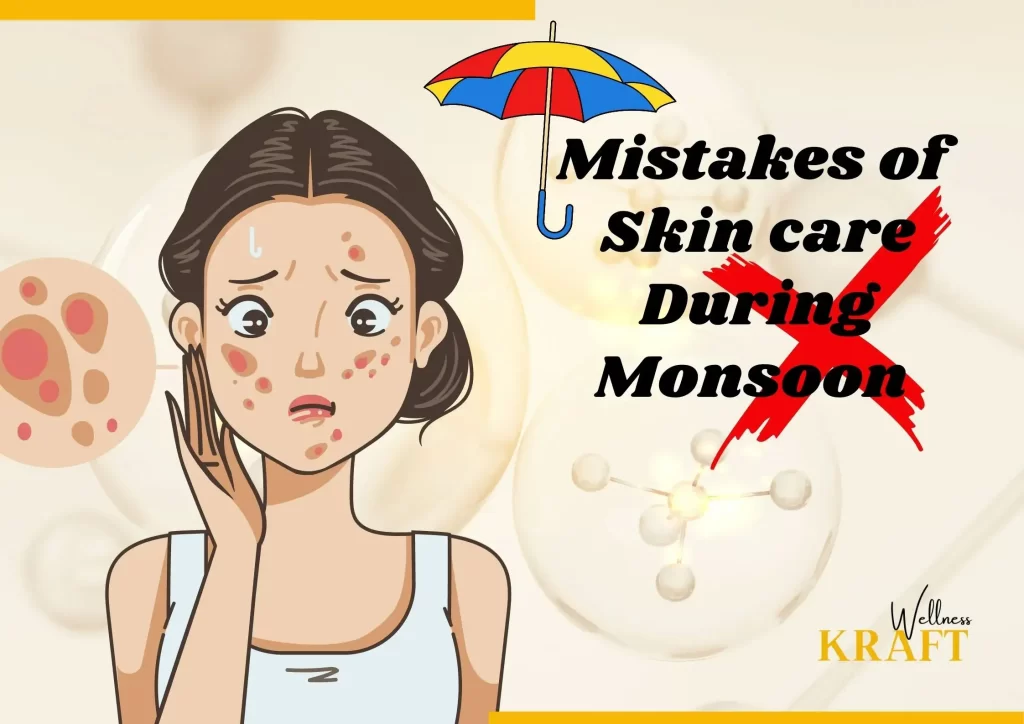
Skincare during the monsoon season needs to be given special consideration. For maintaining healthy and radiant skin, it is crucial to steer clear of typical skincare errors that may exacerbate current skin problems or trigger new ones. Avoid these common mistakes during the monsoon season.
1. Neglecting Sun Protection:
During the monsoon season, it is a common mistake to undertake that sunscreen is not required on cloudy days. Although clouds may be present, UV rays can still harm your skin. It is important to apply sunscreen with an SPF30 or more, regardless of the weather conditions.
2. Skipping Cleansing:
Regular skin cleansing is crucial during the monsoon season due to the higher levels of humidity and sweat. Skipping facial cleansing can result in blocked pores and the development of acne. For effective cleansing, it is suggested to use a mild cleanser that is suitable for your skin type. Make sure to cleanse your face twice every day to eliminate impurities, dirt, and excess oil.
3. Over-Exfoliating:
Exfoliation is vital for eliminating dead skin cells and unclogging pores, but excessive exfoliation can damage your skin, particularly during the monsoon season. Over-exfoliating can lead to the removal of the skin’s essential oils and disturb its moisture equilibrium. For ideal skin health, it is recommended to exfoliate 2-3 times per week using a mild exfoliating mask or scrub.
4. Forgetting to Moisturize:
During the monsoon season, there is a common misconception that moisturizers are pointless. Though the humidity levels may be high, it can still cause dehydration of the skin resulting in dryness and lack of radiance. Choose a non-comedogenic and lightweight moisturizer that offers hydration without weighing down your skin.
5. Neglecting Fungal Infections:
Humid conditions are favorable for the growth of fungal infections, and the monsoon season provides an ideal environment for their proliferation. Overlooking symptoms of fungal infections like itchiness, redness, or rashes can exacerbate the situation. In case you experience any of these symptoms, it is recommended to consult a medical expert and follow to the recommended treatment.
6. Using Heavy Makeup:
For optimal results during monsoon season, it is recommended to use minimal and lightweight makeup. Using excessive makeup can cause pore blockage and result in skin breakouts. Choose water-based or oil-free products to promote better skin respiration. Don’t forget to completely remove your makeup before sleeping to avoid potential skin problems.
7. Neglecting Hydration:
Maintaining suitable hydration is essential for promoting healthy skin, irrespective of the time of year. Staying hydrated by drinking enough water can aid in eliminating toxins, moisturize your skin internally, and enhance its overall look. Maintain a healthy moisture balance in your skin during the monsoon season by drinking plenty of water.
8. Not Adjusting Your Skincare Routine:
Adapting your skincare routine to changing weather conditions is key for finest results. Seasonal changes can affect the effectiveness of skincare routines. What may work well during dry winter months may not be as effective during the monsoon season. Be mindful of your skin’s requirements and adapt accordingly. Opt for lightweight products that cater to oil control and target specific concerns such as acne or fungal infections.
To keep your skin healthy, clear, and radiant during the monsoon season, it’s important to clear of these common skincare mistakes. Maintain a regular skincare regimen, pay attention to the quality of the skincare products you choose, and give importance to moisturization and protecting your skin. Experience the beauty of the monsoon season while ensuring your skin stays healthy and radiant.
Chemical Reaction of Skin During Monsoon
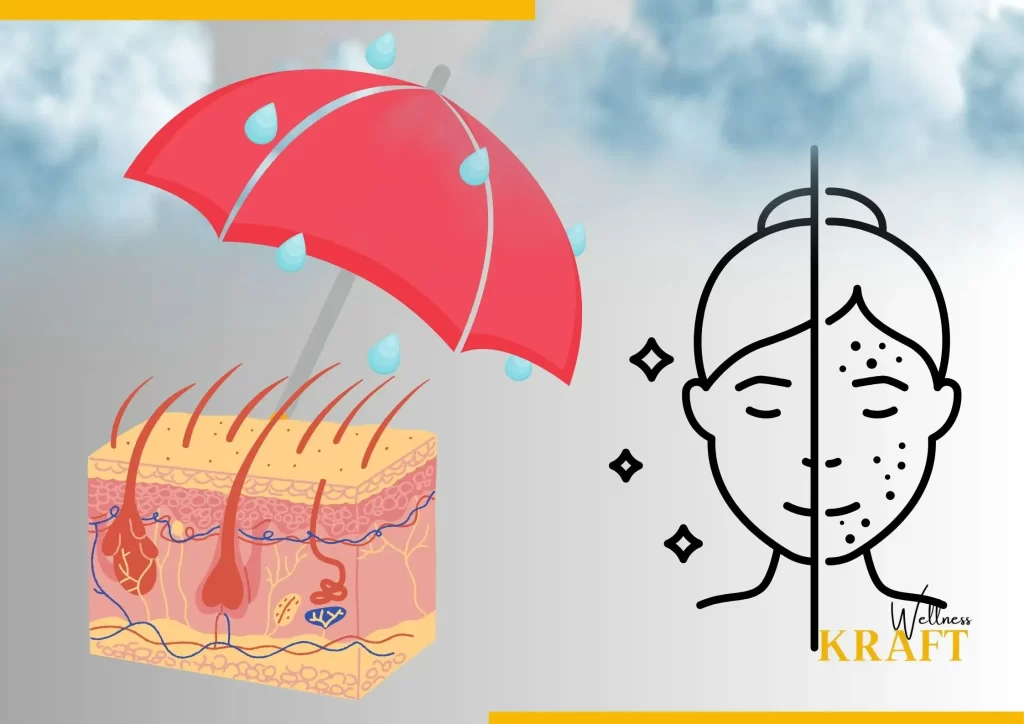
The monsoon season can cause chemical reactions in the skin due to atmospheric changes. Discover some of the chemical reactions that take place during monsoon season.
1. Increased Oil Production:
The elevated humidity levels of the monsoon season can trigger the sebaceous glands to produce excess oil, resulting in greasy and oily skin. To challenge this issue, you can use formulations that contain oil-controlling ingredients like salicylic acid, witch hazel, or tea tree oil. These ingredients aid in controlling sebum production and promoting a well-balanced complexion.
2. Hydration and Moisture Balance:
Even with higher humidity levels, the skin may still become dehydrated from air conditioning and prolonged exposure to rain. Products that include humectants such as hyaluronic acid, glycerin, or aloe vera can effectively draw in and maintain moisture, subsequently well-hydrated and plump skin.
3. Fungal Infections:
Monsoon season can create a favorable environment for fungal growth, resulting in common infections such as ringworm and athlete’s foot. To prevent fungal growth and get relief, one can use antifungal formulations that include clotrimazole, terbinafine, or ketoconazole and apply them to the affected areas.
4. Acne and Breakouts:
Humidity and sweating can lead to clogged pores, causing acne breakouts. Acne can be controlled by using formulations containing ingredients such as benzoyl peroxide, salicylic acid, or Sulphur. These ingredients work by reducing excess oil, unclogging pores, and fighting bacteria.
5. Oxidative Stress:
Monsoon season can increase the likelihood of oxidative stress on the skin due to the higher humidity levels in the air. Guard your skin from damage by using formulations that are rich in antioxidants such as vitamins C and E, green tea extract, or niacinamide. These ingredients can help neutralize free radicals and keep your skin healthy.
6. Irritation and Inflammation:
During the monsoon season, skin sensitivity and irritation can occur due to various factors such as humidity, rainwater, and exposure to environmental pollutants. Discover the calming benefits of chamomile extract, aloe vera, and oat extract in our soothing formulations. These ingredients work together to reduce inflammation and provide relief to irritated skin.
Formulations come in various forms such as cleansers, toners, moisturizers, serums, or spot treatments, tailored to address specific concerns. Choosing the right skincare formulations that cater to your skin type and concerns and adhering to a consistent skincare regimen is crucial to combat the chemical reactions and uphold healthy skin during the monsoon season.
The Significance of Seeking Professional Guidance
For best results, it is recommended to seek professional guidance in addition to following a regular skincare routine and incorporating natural remedies. Visiting a dermatologist can assist in identifying individual skin issues and offer customized suggestions. Consulting a dermatologist can assist in customizing a skincare regimen that provides to your specific requirements, providing best care for your skin.
Concluding Thoughts on Skin Care During Monsoon
During the monsoon season, our skin faces specific challenges caused by high humidity and excess moisture. By comprehending the impact of monsoon on our skin and incorporating an appropriate skincare regimen, we can maintain the health and glow of our skin.
Don’t overlook to follow a skincare routine that includes cleansing, hydrating, moisturizing, and using sun protection to keep your skin healthy and glowing. For optimal skin health, it is recommended to maintain a balanced diet and incorporate natural remedies.
For addressing specific skin concerns, it is recommended to seek professional advice. Enjoy the rainy season while maintaining healthy skin! There are no specific keywords or phrases to rewrite in this text.
Key Takeaways on Skin Care During Monsoon
1. To protect your skin from damaging UV rays, it is recommended to use sunscreen with an SPF30 or above, even when the sky is overcast.
2. Maintain healthy and clear skin by cleansing your face twice a day to remove dirt, oil, and impurities.
3. Prevent stripping your skin’s natural oils and moisture by avoiding excessive exfoliation. For best skin health, it is recommended to exfoliate gently 2-3 times per week.
4. Sustain your skin’s hydration and prevent dryness by using a lightweight, non-comedogenic moisturizer for moisturizing.
5. Prevent and treat fungal infections by maintaining dry skin, changing out of damp clothing, and utilizing antifungal products in vulnerable areas.
6. Optimize your skincare routine for the monsoon season by using lightweight products, implementing oil control measures, and addressing concerns such as acne or fungal infections.
FAQs on Skin Care During Monsoon
1. Do skin allergies occur due to monsoon weather?
The skin may become more vulnerable to allergies and irritations due to the higher humidity levels during the monsoon season. Keeping the skin clean and moisturized is important to reduce the risk while taking good skin care during monsoon season.
2. What is the ideal frequency for face cleansing during the monsoon season?
For ideal skin health, it is suggested to cleanse your face twice daily – once in the morning and again before bed – to eliminate dirt, pollutants, and excess oil. It is important to avoid excessive cleansing as it may remove the natural oils.
3. Is it necessary to wear sunscreen on cloudy days as skin care during monsoon?
It is recommended to apply sunscreen on cloudy days as UV rays can still penetrate through clouds and harm your skin. Select a sunscreen with broad-spectrum protection and a minimum of SPF 30, and apply it generously. This will shower positive effect on skin care during monsoon.
4. What are the foods to avoid while following skin care during monsoon?
While following skin care during monsoon season, it is recommended to reduce the consumption of oily and spicy foods as they may worsen skin problems. To improve your health, it is recommended to consume a well-balanced diet that includes plenty of fruits, vegetables, and foods high in antioxidants.
5. Is it necessary to seek advice from a dermatologist for my skin care during monsoon season?
To ensure the best skin care during monsoon season or if you have particular skin issues, it is advisable to seek advice from a dermatologist. Personalized guidance can be provided based on your unique requirements.
6. How does monsoon season impact skin health?
During the monsoon season, the skin tends to produce more oil, which can result in the growth of acne. High humidity levels increase the susceptibility of the skin to fungal infections and other irritations.
7. What are the common skin problems during the monsoon season?
During the monsoon season, individuals commonly experience skin issues such as acne breakouts, fungal infections, dullness, and excessive oiliness. A proper routine skin care during monsoon helps to maintain skin health.
8. How to safeguard your skin from fungal infections in the monsoon season?
To avoid fungal infections on your skin, it is important to maintain cleanliness and dryness. To prevent infections, it is recommended to refrain from wearing moist clothing and apply antifungal powders or creams to susceptible areas.
9. Is it recommended to increase skin exfoliation frequency during the monsoon season?
Opt for mild exfoliators and limit the frequency to 2-3 times per week to prevent excessive dryness of the skin during the rainy season. This process of skin care during monsoon helps to keep the skin hydrated.
10. What are some effective home remedies for skin care during monsoon?
Some of the effective home remedies for skin care during monsoon are:
-For acne, consider applying a paste made of neem and lemon juice.
-For fungal infections, try a mixture of water and apple cider vinegar.
-To brighten dull skin, a face pack made of papaya pulp may be beneficial.




